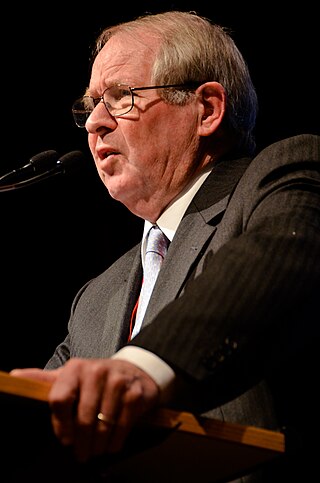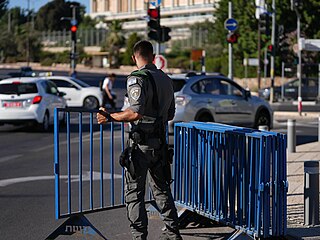Related Research Articles

The Palestinian territories are the two regions of the former British Mandate for Palestine that have been occupied by Israel since the Six-Day War of 1967, namely the West Bank and the Gaza Strip. The International Court of Justice (ICJ) has referred to the West Bank, including East Jerusalem, as "the Occupied Palestinian Territory", and this term was used as the legal definition by the ICJ in its advisory opinion of July 2004. The term occupied Palestinian territory was used by the United Nations and other international organizations between October 1999 and December 2012 to refer to areas controlled by the Palestinian National Authority, but from 2012, when Palestine was admitted as one of its non-member observer states, the United Nations started using exclusively the name State of Palestine. The European Union (EU) also uses the term "occupied Palestinian territory". The government of Israel and its supporters use the label "disputed territories" instead.
Issues relating to the State of Israel and aspects of the Arab–Israeli conflict and more recently the Iran–Israel conflict occupy repeated annual debate times, resolutions and resources at the United Nations. Since its founding in 1948, the United Nations Security Council, has adopted 79 resolutions directly related to the Arab–Israeli conflict as of January 2010.

The International Day of Solidarity with the Palestinian People is a UN-organized observance. Events are held at the United Nations headquarters in New York, as well as at the United Nations offices at Geneva, Vienna and Nairobi. It is generally held on November 29 each year to mark the anniversary of resolution 181 which advocated for the partition of Palestine into two States: one Arab and one Jewish. In 2003, it was observed on December 1.

The United Nations Human Rights Council (UNHRC) is a United Nations body whose mission is to promote and protect human rights around the world. The Council has 47 members elected for staggered three-year terms on a regional group basis. The headquarters of the Council are at the United Nations Office at Geneva in Switzerland.
The United Nations General Assembly has granted observer status to international organizations, entities, and non-member states, to enable them to participate in the work of the United Nations General Assembly, though with limitations. The General Assembly determines the privileges it will grant to each observer, beyond those laid down in a 1986 Conference on treaties between states and international organizations. Exceptionally, the European Union (EU) was in 2011 granted the right to speak in debates, to submit proposals and amendments, the right of reply, to raise points of order and to circulate documents, etc. As of May 2011, the EU is the only international organization to hold these enhanced rights, which has been likened to the rights of full membership, short of the right to vote.
The status of territories captured by Israel is the status of the Gaza Strip, the West Bank, the Golan Heights, and the Sinai Peninsula, all of which were captured by Israel during the 1967 Six-Day War.
The United Nations Conciliation Commission for Palestine (UNCCP) or Palestine Conciliation Commission (PCC) was created by UN-resolution 194 of December 11, 1948, with the aim of mediating in the Arab–Israeli conflict. The Commission consisted of France, Turkey and the United States, and its official headquarters was set up in Jerusalem on January 24, 1949. The commission met separately with Israeli and Arab governments from February 12–25, 1949, with Muhammad Nimr al-Hawari of the General Refugee Congress (GRC) and a Palestinian refugee delegation on March 21 in Beirut, and on April 7 in Tel Aviv with Israeli prime minister David Ben-Gurion. It then proposed the Lausanne Conference of 1949.

Corpus separatum was the internationalization proposal for Jerusalem and its surrounding area as part of the United Nations Partition Plan for Palestine. It was adopted by the United Nations General Assembly with a two-thirds majority in November 1947. According to the Partition Plan, the city of Jerusalem would be brought under international governance, conferring it a special status due to its shared importance for the Abrahamic religions. The legal base ("Statute") for this arrangement was to be reviewed after ten years and put to a referendum. The corpus separatum was again one of the main issues of the post-war Lausanne Conference of 1949, besides the borders of Israel and the question of the Palestinian right of return.

Christopher John Robert Dugard is a South African professor of international law. His main academic specializations are in Roman-Dutch law, public international law, jurisprudence, human rights, criminal procedure and international criminal law. He has served on the International Law Commission, the primary UN institution for the development of international law, and has been active in reporting on human-rights violations by Israel in the Palestinian territories.

In 2006 the Israel Defense Forces launched Operation "Autumn Clouds" beginning on 1 November 2006, following numerous rocket and mortar attacks on southern Israel, when the Israeli Defense Forces entered the Gaza Strip triggering sporadic fighting near Beit Hanoun. The operation was the first military endeavor undertaken by the Israeli military since Operation "Summer Rains" in the summer of 2006. The operation was launched to stop Palestinian rocket attacks into Israel.
The 1967 Palestinian exodus or Naksa refers to the flight of around 280,000 to 325,000 Palestinians out of the territories captured by Israel during and in the aftermath of the Six-Day War, including the razing of numerous Palestinian villages of Imwas, Yalo, and Bayt Nuba, Surit, Beit Awwa, Beit Mirsem, Shuyukh, Al-Jiftlik, Agarith and Huseirat and the "emptying" of the refugee camps of Aqabat Jaber and ʿEin as-Sultan.
Issues relating to the State of Palestine and aspects of the Israeli–Palestinian conflict occupy continuous debates, resolutions, and resources at the United Nations. Since its founding in 1948, the United Nations Security Council, as of January 2010, has adopted 79 resolutions directly related to the Arab–Israeli conflict.

The United Nations General Assembly Fourth Committee is one of six main committees of the United Nations General Assembly. It deals with a diverse set of political issues, including UN peacekeeping and peaceful uses of outer space. However, the issues of decolonization and the Middle East take up most of its time.

The United Nations General Assembly Resolution 43/177 of 15 December 1988 was a resolution in which the United Nations General Assembly acknowledged the proclamation of the State of Palestine and the use of the designation "Palestine", referring to the PLO in the UN. Further, the Assembly affirmed the need for sovereignty by the Palestinian people over their territory occupied in 1967 by Israel. The resolution is titled "43/177. Question of Palestine".

The United Nations General Assembly Resolution 43/176 of 15 December 1988 was a resolution in which the General Assembly called for the convening of an International Peace Conference on the Middle East, under the auspices of the United Nations. The resolution is titled "43/176. Question of Palestine". The peace conference was proposed in the framework of international politics.
United Nations General Assembly resolution 67/19 is a resolution upgrading Palestine to non-member observer state status in the United Nations General Assembly. It was adopted by the sixty-seventh session of the United Nations General Assembly on 29 November 2012, the date of the International Day of Solidarity with the Palestinian People and the 65th anniversary of the adoption by the General Assembly of resolution 181(II) on the Future Government of Palestine. The draft resolution was proposed by Palestine's representative at the United Nations. It, however, maintains the status of the Palestinian Liberation Organization as the representative of the Palestinian people within the United Nations system. Though strongly contested by the United States and the government of Israel, former Israeli Prime Minister Ehud Olmert expressed support for the measure. The motion was seen as largely symbolic, though it could allow Palestine to start proceedings at the International Criminal Court against Israel. Its timing, following a year in which Palestine obtained membership of UNESCO and the UN Security Council was unable "to make a unanimous recommendation" on their application for full UN membership, and coming several days after the completion of Operation Pillar of Defense, was also noted. The new status equates Palestine with that of the Holy See within the United Nations system and implicitly recognises Palestinian sovereignty.

The Palestinian Declaration of Independence formally established the State of Palestine, and was written by Palestinian poet Mahmoud Darwish and proclaimed by Yasser Arafat on 15 November 1988 in Algiers, Algeria. It had previously been adopted by the Palestinian National Council (PNC), the legislative body of the Palestine Liberation Organization (PLO), by a vote of 253 in favour, 46 against, and 10 abstaining. It was read at the closing session of the 19th PNC to a standing ovation. Upon completing the reading of the declaration, Arafat, as Chairman of the PLO, assumed the title of President of Palestine. In April 1989, the PLO Central Council elected Arafat as the first President of the State of Palestine.

Legal Consequences arising from the Policies and Practices of Israel in the Occupied Palestinian Territory, including East Jerusalem is a proceeding in the International Court of Justice (ICJ), stemming from a resolution adopted by the United Nations General Assembly (UNGA) in December 2022, requesting the Court to render an advisory opinion. In January 2023, the ICJ acknowledged a request from the UNGA for an advisory opinion on the legal consequences arising from the policies and practices of Israel in the occupied Palestinian territory, including East Jerusalem. Public hearings opened on Monday, 19 February 2024 in The Hague with 52 states and three international organizations participating.
References
- ↑ Respect for and implementation of human rights in occupied territories Archived 2021-04-21 at the Wayback Machine , General Assembly resolution 2443 (XXIII) of 19 December 1968.
- 1 2 Silverburg, 2002, p. 287.
- 1 2 Heaney, Christopher. "Annual Mission Statement of the UN Special Committee to Investigate Israeli Practices Affecting the Human Rights of the Palestinian People".
- ↑ "UN General Assembly Resolution 2727 (December 1970)". www.jewishvirtuallibrary.org.
- ↑ "UN General Assembly Resolution 2851 (December 1971)". www.jewishvirtuallibrary.org.
- ↑ Allen, Lori (2021). A History of False Hope: Investigative Commissions on Palestine. Stanford University Press. pp. 144–175. ISBN 9781503614192.
{{cite book}}: CS1 maint: date and year (link) - ↑ Office of the High Commissioner of Human Rights (15 July 2022). "End-of-Mission Statement of the UN Special Committee to Investigate Israeli Practices".
{{cite web}}: CS1 maint: url-status (link)